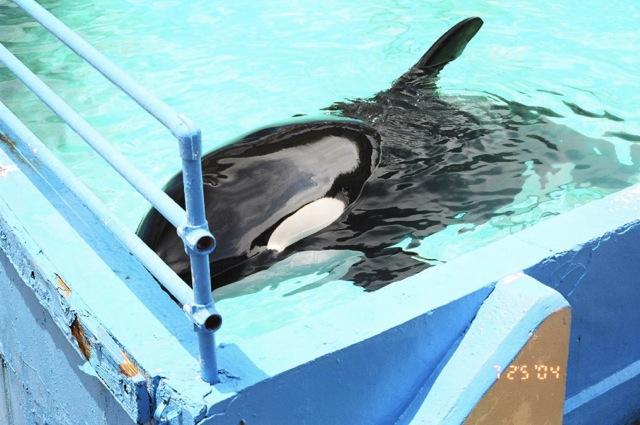Op-Ed- It is time to bring Lolita home
Lolita, first called Tokitae, is a female orca in her 40s who is a member of her extended family, Washington’s Southern Resident orcas. In 1970 she was ripped away as a youngster in the notorious Penn Cove captures. She is kept in a 35' x 80' x 20' deep concrete tub in a theme park in Miami. No doubt she still remembers her life before capture, her family in L pod, and the waters of the Salish Sea.
Mon, 12/09/2013
By Howard Garrett, Orca Network
The campaign for Lolita's retirement is based on research by Ken Balcomb at the Center for Whale Research on San Juan Island. In 1995, Governor Mike Lowry, Sec. of State Ralph Munro and Balcomb announced the start of the Lolita Come Home campaign. Since then Orca Network has conducted a public awareness campaign to present the case for her return home.
Despite many demonstrations in Miami, a powerful documentary called Lolita – Slave to Entertainment, and much national attention on Lolita, the park is still making over $1 million a year from Lolita's circus routines and has refused to consider our proposal. Annual Penn Cove Capture Commemoration events are held each August 8.
In February, 2010, a distressed captive male orca named Tilikum killed his human companion, SeaWorld trainer Dawn Brancheau. Public response to the traumatic event was immediate, intense, and sustained. Virtually every media report has mentioned that orcas should never be held captive in the first place.
Within days former SeaWorld trainers stepped forward to present the case against orca captivity. Soon OSHA charged SeaWorld with endangering their employees, making the issue a federal case and bringing out documents and videos never before seen outside SeaWorld. Soon a feature-length expose of orca captivity appeared in Outside magazine, and author David Kirby saw the ingredients for Death at SeaWorld, now a best-seller.
About that time filmmaker Gabriela Cowperthwaite wondered why a seemingly docile captive orca would suddenly kill his trainer. Her film, Blackfish, is now opening hearts and minds across the country and around the world with the clear message that captivity stresses and kills orcas. Lolita isn't mentioned in Blackfish, but the film is changing how people view captive orca shows everywhere.
By late 2010 attorneys were devising strategies to challenge the captive orca industry's right to exploit these intelligent, highly social, wide-ranging mammals for entertainment revenue. Within months three important legal initiatives were launched.
First they sued SeaWorld for violating the 13th Amendment against slavery, naming five captive orcas as plaintiffs. The suit was dismissed, but not before generating widespread public understanding that for orcas, captivity is indeed equivalent to slavery.
The attorneys discovered that the Miami park is granted an annual permit by the Dept. of Agriculture. They established that violations of the Animal Welfare Act - lack of space, exposure to the hot sun, and loneliness - caused Lolita to suffer. Then they sued the USDA for failure to uphold those provisions. That suit is now pending in a Miami federal district court, and if successful the permit could be revoked.
The third suit challenges language in the ESA listing for the Southern Resident orcas ̶ Lolita's family ̶ that specifically: "does not include killer whales from J, K, or L pod placed in captivity..." The National Marine Fisheries Service has until January 24 to arrive at a determination. If the petition succeeds Lolita should be allowed to return to her home waters.
Our proposal provides a plan for Lolita’s safe return home and long-term retirement if needed. Prospects have never been better for the tide to finally turn and wash Lolita home at last, but it’s anyone’s guess how much time we have. Every day that she survives in the tank is another unlikely miracle, and yet she appears to be in relatively good health. Her patience and good nature seem so mysterious, but if we can get her home, her family will probably understand her better.



